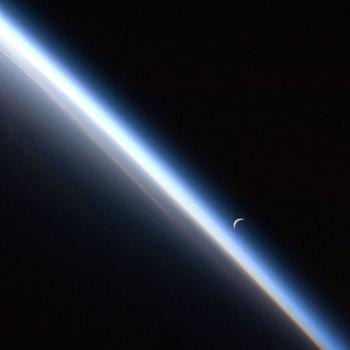
From a British astrophysicist and theologian:
Anthropic balances should not be dismissed. They are a significant factor of the way the world is, and we need to note that they have led a number of scientists to questions of religion.
Of course, such insights cannot be used to prove the existence of God. In 1779 the philosopher David Hume attacked the logic of inferring the Christian God from the nature of the universe. Among a large number of logical problems that he raised, one is particularly important for our discussion of anthropic balances.
He argued that even if a divine designer could validly be inferred, we would not be able to postulate a Christian God who is good, wise and powerful. Hume argues that for a given effect you can only infer a cause sufficient to produce that effect. Therefore from a finite creation one can never infer an infinite God. In addition, from the diversity of the world one cannot infer one God. More importantly, even if one is able to reconcile evil with an omnipotent and wholly good God, one cannot infer a wholly good God from a manifestly imperfect world where evil exists. Kant also came to the conclusion that the design argument at most could only lead to a cosmic architect using existing material. Now this is surely correct.
This is illustrated very well by the kind of god both [Sir Fred] Hoyle and [Paul] Davies end up with. Neglecting the possibility of historical revelation and religious experience as a possible source of knowledge, they suggest that there is no conflict between a universe evolving according to the laws of physics and one which is nevertheless subject to intelligent control. It is from this basis that Davies suggests a ‘natural God’ who operates within the laws of nature, directing and controlling the evolution of the cosmos. This natural god produces within the laws of physics a complex and orderly cosmos.
Therefore, the use of the design argument has led to a god who is not transcendent but contained by the universe and its laws. Davies’ God is more of a ‘demiurge’. This term was used by the Greeks to denote a craftsman ‘god’ rather than the supreme creator being.
A similar conclusion is arrived at by Professor Brian Josephson, the Cambridge solid-state physicist. Josephson sees God in the chaotic quantum fluctuations which quantum field theory would claim to exist even in a perfect vacuum. Now for Josephson, as for Davies and Hoyle, God resides within the universe. In such an approach the distinction between God and nature becomes terribly blurred, and is reminiscent of the impersonal pantheism of Spinoza.
The ‘surer path to God’ [which the astrophysicist Paul Davies says belongs to science rather than religion] has led to a god remade to harmonise with the prevailing scientific ethos. Hanbury Brown, the Australian astronomer, has recently stated that this is what needs to be done to religion. The idea of God as person is dismissed as belonging ‘to an earlier simpler stage in the history of thought’. Davies suggests that his god might be well enough to satisfy most believers, but it is clear that this is not the same God of Abraham, Isaac and Jacob.
However, the point must be made that even if the design argument cannot lead to the Christian God, this does not mean that it is without value. The insight of anthropic balances within the universe can only be a starting point. To use Hume’s imagery, if we were able to see only one side of a pair of scales with a mass of ten grams on it and we saw it rise, then of course from that observation we would not be able to say what the weight on the other side was. However, we could say that there was a force on the other end (whether a mass greater than ten grams or the hand of a person), and this is not a trivial piece of information.
If the design argument as a way to prove the existence of God is no longer valid, then there is still something to be said despite all the criticisms. These anthropic balances may suggest that there is more to the universe than science can explain, and for some this will be a pointer to God. [Theoretical physicist Stephen] Hawking comments, ‘The odds against a universe like ours emerging out of something like the Big Bang are enormous. I think there are clearly religious implications.’
David Wilkinson, God, Time and Stephen Hawking: An Exploration Into Origins (London: Monarch Books, 2001), 141-143.












